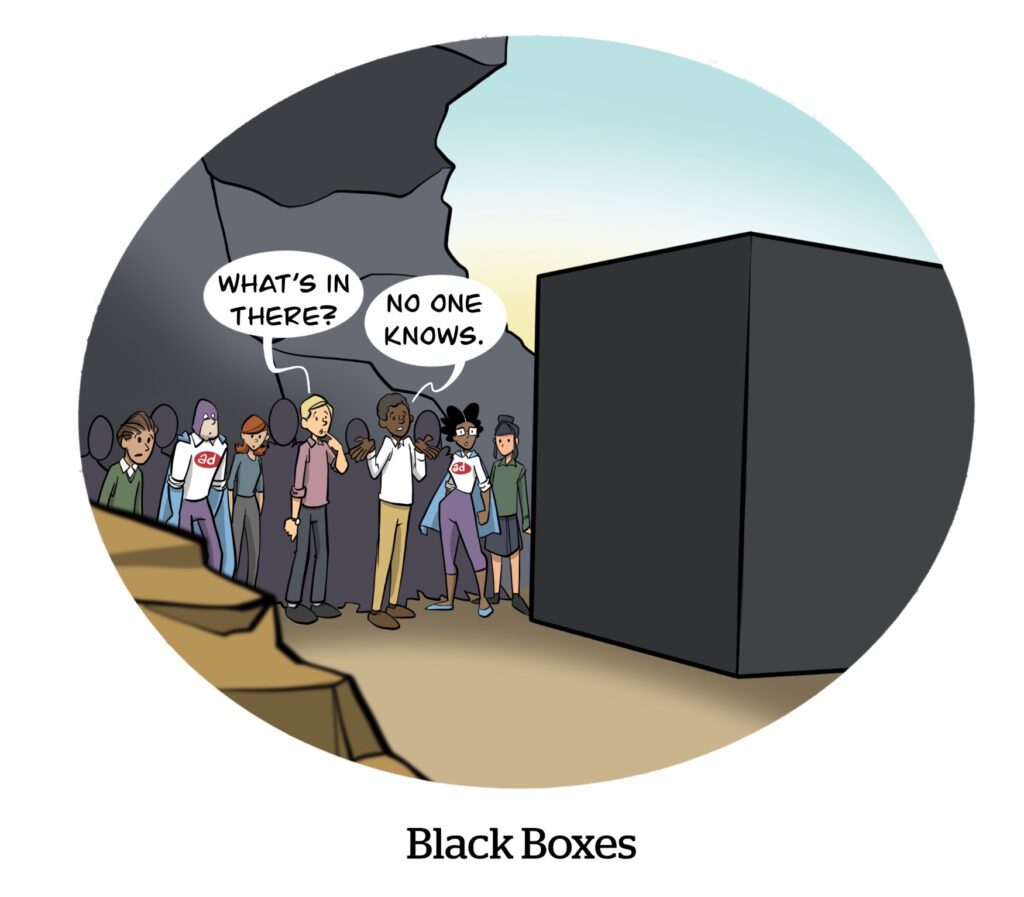Here’s today’s AdExchanger.com news round-up… Want it by email? Sign up here.
The New Creative Controls
Does “alt_copy_copy2_brand_red_hold” mean anything to you?
That’s the way most creative units and product ads are titled, and any associated metadata would likely be the brand’s name and the banner ad size. Meh.
But a generative AI bot could beef up that metadata exponentially with a full description of the content, which would be a game changer for ad tech.
PPC agency Discosloth offers a useful example of how this might work in action.
Say a brand is running ads for a “dehydrated rice and beans meal,” including product info, search listing, creative, etc. Based on that data, Google’s machine-learning-powered Performance Max would target likely competitors in rice/bean groceries or bid on searches for quick meals with protein.
But that would be wrong.
The more appropriate audience would be backpackers and preppers who buy food for long-term storage.
Today, marketers must bring those insights and that savviness themselves – but it could eventually be AI’s province. If an AI automatically includes information within the metadata to make the backpacking appeal of a rice and beans meal more apparent, then PMax could more quickly figure out which audience it should be targeting.
Settlement Mode
Kochava and other location data companies beware: The FTC has barred its first data broker from selling sensitive location data.
X-Mode Social and its spinoff company, Outlogic, were charged with selling mobile data on people’s visits to sensitive locations – including health care facilities, reproductive health clinics and houses of worship – without obtaining the proper consent or anonymizing the data appropriately.
Yesterday, the FTC announced a settlement with X-Mode that will prohibit it from selling any of this sensitive location data to advertisers.
X-Mode, which started as an app called Drunk Mode intended to prevent people from making drunk calls and texts, collects location data from apps that have its SDK installed. But concerns about its data handling predate the FTC’s case. Apple and Google banned apps with X-Mode’s SDK in December 2020.
According to the FTC, X-Mode/Outlogic did not have any protections in place to prevent location data related to sensitive locations from being sold for advertising purposes until May 2023. It also failed to disclose to consumers how their data would be used. On top of that, X-Mode tied location data to mobile device IDs, which could allow that data to be traced back to individual devices.
As Bloomberg Law reporter Tonya Riley put it, “[Imagine] downloading an app to prevent yourself from sending drunk texts and DHS/DOD/NSA is using it to track you.”
Freevee, We Hardly Knew Ye
Amazon was an early leader in the FAST trend of free ad-supported television streams that monetize TV networks or content libraries and don’t require subscriptions.
After rebranding IMDb TV into a product called Freevee (Get it? It’s free!), Amazon began snapping up content deals, including “Mad Men,” right around the time some studios stopped licensing shows to Netflix.
But for the dozens of Freevee fans out there, say your goodbyes now.
When Prime Video starts running ads later this month, Amazon’s priority will shift entirely to that platform rather than Freevee, which has already been prepped for shutdown with sales and leadership partially reassigned to Prime Video, Business Insider reports.
Prime Video CPMs are expected to be at or above $30. That’s expensive, but far below what Netflix or Disney+ charge – yet markedly higher than Freevee CPMs, which run between $13 and $24.
Although ad buyers like cost-effective reach, it’s clear why Amazon prefers Prime Video.
But Wait, There’s More!
Paul Bannister on LinkedIn: Raptive’s super-early Chrome cookie deprecation data analysis. [post]
Yahoo’s ID testing product lets advertisers compare campaigns with and without cookies. [Adweek]
Magnite and iHeartMedia partner to integrate broadcast and digital audio channels. [release]
A look at the DTC brand that’s making olive oil (and squeeze bottles) cool again. [Ad Age]
You’re Hired!
Extreme Reach names Jo Kinsella as group president. [release]
MGID hires Matthew Villa as head of US sales. [release]
Will Luttrell is the new interim CTO of Good-Loop. [post]
LG Ad Solutions appoints Mike Brooks as its global head of business development and partnerships. [release]










